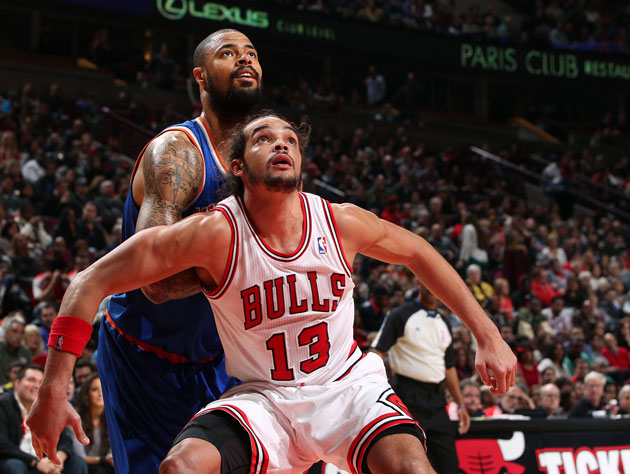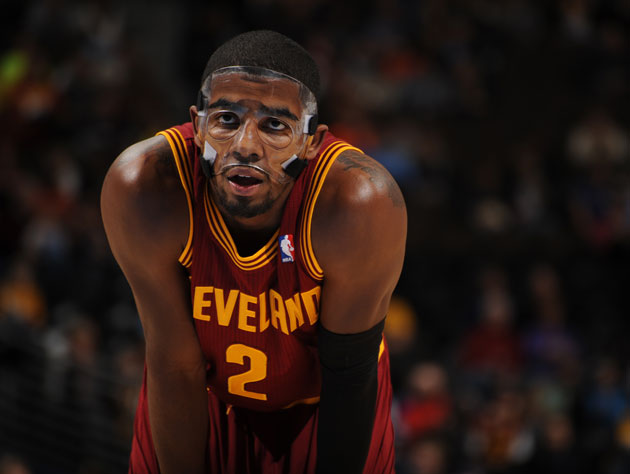
You’ve done it, NBA fans. You’ve done hired the hitmakers – your 2013 NBA All-Star Game starters. Kevin Garnett, LeBron James, Carmelo Anthony, Dwyane Wade and Rajon Rondo out East; with Kobe Bryant, Dwight Howard, Chris Paul, Kevin Durant and Blake Griffin out West. Two sterling crews, with 10 players that truly deserve not only the All-Star nod, but the starting designation. After weeks of worry about Andrew Bynum or Jeremy Lin taking a slot, this was a fantastic outcome.
Now that you’ve nailed it, fans, we hand the baton to NBA coaches to fill out the rest of the All-Star roster. And those coaches, apparently too conflicted to check a few boxes, will no doubt hand that baton to their assistant coaches. Who will then utilize per-game stats and name recognition to send seven reserves to Houston for the game on Feb. 17. Weird, seeing as how they tend to watch more game film prior to a Tuesday morning shootaround than most of us do all week.
To help these coaches in their quest to get it right, we humbly present our choices for the Eastern bench. Three front court, two back court, and two wild card selections are asked of the voters. Our picks are listed after the jump.

Guards: Kyrie Irving, Cleveland Cavaliers. Jrue Holiday, Philadelphia 76ers.
A very good case could be made for Irving to start ahead of Rondo or even Wade, but considering the games he’s missed due to injury and his pitiful defense a reserve role doesn’t seem all that damning. There are some that would argue that Irving should have made the team last season, and considering his offensive production it’s hard to dismiss him acting as the first rookie guard to have made the All-Star team since Michael Jordan. He’ll just have to handle being a deserved first-time All-Star at the age of 20.
Holiday may not seem like an All-Star due to lack of name recognition, but he’s carried a 76er team that has been on the fringes of the playoffs all season, working up efficient numbers over the course of a much-needed 38 minutes per game. Nineteen points and nearly nine assists for the Philly guard, who provides sound enough defense and leadership that the notoriously dyspeptic Doug Collins isn’t reaching for the Tums in Andrew Bynum’s absence.
Frontcourt: Chris Bosh, Miami Heat. Tyson Chandler, New York Knicks. Brook Lopez, Brooklyn Nets.
The Nets haven’t solved all of their defensive woes, and he’s still a ways away from turning into a presence on that end, but Lopez’s production in his fifth season is not to be ignored. Nearly 19 points while shooting a high percentage from several spots on the floor, he rarely turns the ball over, and his rebounding has shot way up. It’s almost … passable!
Chandler had a case to be selected as a starter, and though Kevin Garnett has played limited minutes this year we still think KG has more of an overall impact. Still, as the only defensive anchor on a Knicks working with greybeards or gut-busters at guard and small forward-sized power forwards, Chandler has been a maestro. He also misses a shot once every 12 games.
Bosh’s rebounding, for whatever reason, has been terrible this year. It’s true that he has to cover quite a bit on the defensive end and he’s often best suited boxing out as others grab the carom, but it is a worry. What isn’t worrying is his efficiency and overall offensive production – 54 percent shooting and 17.5 points per game despite acting as a third cog on that end, and playing only 33 minutes a night. I agree that role and status on a team shouldn’t be factored into what is an individual honor, but Bosh is still an All-Star.
Wild cards: Joakim Noah, Chicago Bulls. Al Horford, Atlanta Hawks.
Nobody is more aware of the fact that Joakim Noah’s impressive stats are due to the fact that he plays over 38 minutes per game, because I’m the Bulls fan that gulps and frets every time that Noah leans over to catch his breath as an opponent lines up a free throw. Still, while I won’t hit you with silly nonsense about intangibles or things you don’t see in the box score – he provides intangibles and things you don’t see in the box score. He initiates the team’s offense, often without garnering an assist. He leads the team’s defense, moving and adapting in ways that don’t often rely in a defensive rebound or block. And while aesthetics shouldn’t serve as a deciding vote – screw it. I prefer watching Joakim Noah play his style of basketball to any other player in this league.
Horford was a tough call, because he won’t tilt many games in the favor of his Hawks, and he doesn’t stick out as some sort of ultrastar. That’s of no concern, though, because his production is so good. He’s able to stay on the court for nearly 37 minutes (which, to me, gives him the miniscule edge over David West) as a defensive-minded big, and though his rebounding could stand improving, he rarely makes mistakes offensively and his sheer output is enough to give him the final nod.
Also considered: David West, Paul Pierce, Luol Deng.
Deng doesn’t shoot well and his offensive numbers are inflated because of his league-leading minutes per game count, but his defense is so stellar that he almost deserves a selection even if he were averaging two or three fewer points per game.
Paul Pierce’s highlights seem to be few and far between these days, but his workmanlike production is still at an All-Star level. And the Indiana Pacers would average about 45 points per game and be spiraling toward the lottery if it weren’t for David West. All three of these players are having All-Star level seasons, and I wouldn’t have a problem in the slightest if coaches chose them ahead of Al Horford.
No comments:
Post a Comment